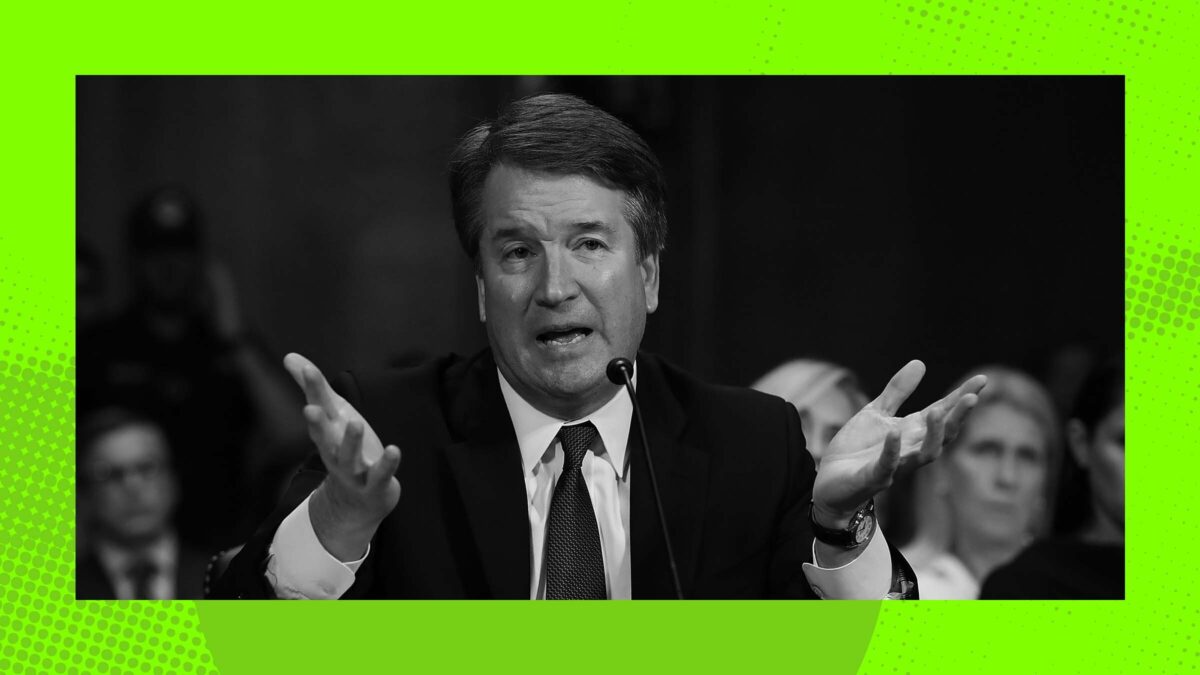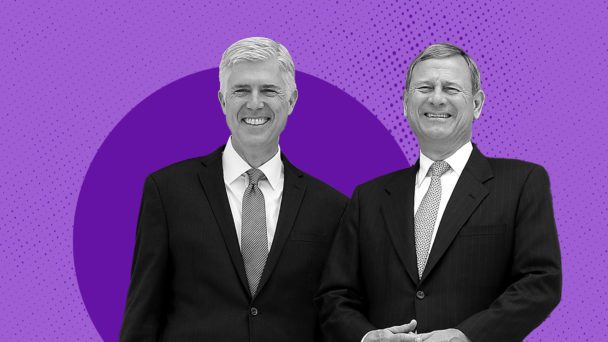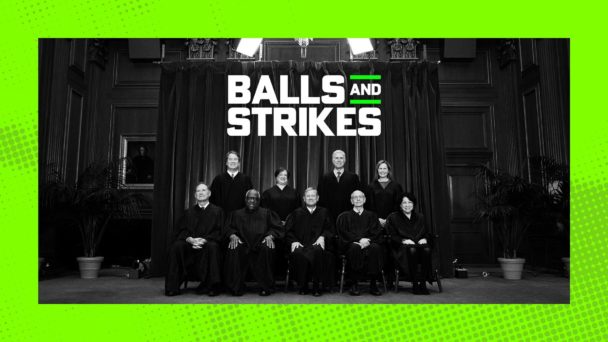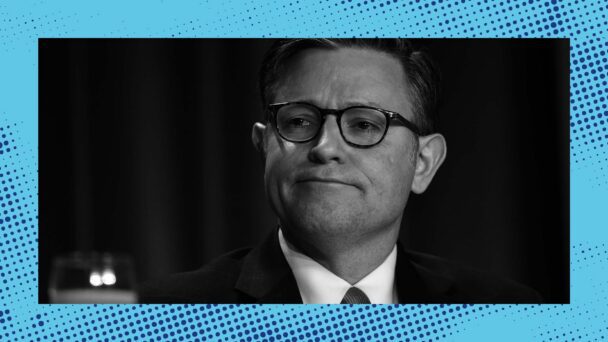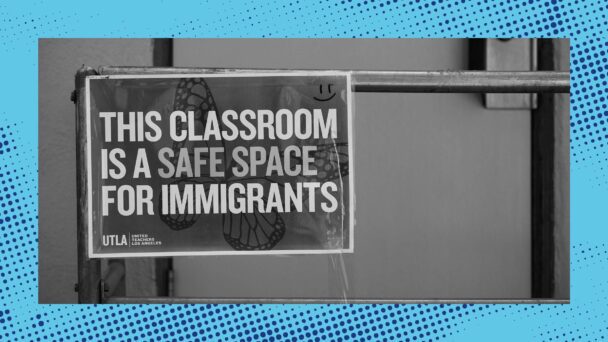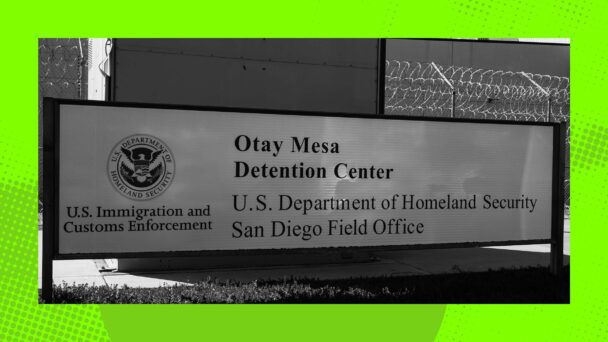Earlier this week, the Supreme Court handed down a one-page order that greenlit federal immigration officers’ use of blatant racial profiling when conducting armed raids in the Los Angeles area. A lower court had temporarily barred ICE from detaining people based solely on factors like “they are speaking Spanish” or “they are day laborers waiting outside Home Depot in the morning.” By blocking that lower court order, the members of the Court’s conservative supermajority have once again used the shadow docket to give their very favorite president everything for which he asks. Only the three liberals noted their dissent.
“We should not have to live in a country where the Government can seize anyone who looks Latino, speaks Spanish, and appears to work in a low wage job,” wrote Justice Sonia Sotomayor. She went on to describe the “indignities” of a ruling that functionally requires Latino people to carry enough documents to answer questions to the satisfaction of masked thugs who cannot stop beating the hell out of people for any reason or no reason at all. “The Constitution does not permit the creation of such a second-class citizenship status,” she said.
As is usually the case with this Court’s pro-Trump shadow docket jurisprudence, the majority did not explain its decision. But one justice, Brett Kavanaugh, wrote a concurring opinion only for himself, which contains—and here I apologize for the legal jargon—some of the stupidest shit I have ever encountered in the U.S. Reports. Over the course of ten pages, Kavanaugh fumbles his way through the sort of legal and factual analysis that a second-year law student would find a little embarrassing, laced with the affected earnestness of someone whose only conception of hardship is when his vacation home’s cleaning crew gets stuck in traffic. I honestly wonder if none of the other conservatives joined it because, although they agree with the bottom-line result, none of them wanted their names publicly associated with this vapid dreck.
First, Kavanaugh cites the Court’s decision in Los Angeles v. Lyons for the proposition that the plaintiffs in this case—people who have been arrested by immigration agents—likely lack standing to sue, because they can’t prove that agents are likely to detain them again under the same circumstances. Lyons is a 1983 case about Adolph Lyons’s attempt to sue for violations of his Fourth Amendment rights after Los Angeles Police Department officers pulled him over for a broken tail light, ordered him out of the car, and then put him in a chokehold until he passed out. (When he came to, they still gave him a ticket.)
The Court, however, ruled that Lyons, a 24-year-old Black man, could not get an injunction barring the cops from using this chokehold in the future, because there was no evidence that the city had formally “authorized” officers to use chokeholds in the course of enforcing minor traffic violations. The majority further justified the result by arguing that Lyons could not show that the cops were imminently likely to find him, detain him, and put him—Adolph Lyons, specifically—in the same life-threatening chokehold in the future.
You can set aside, for a moment, the absurdity of this logic, which has the effect of shielding violent cops from even modest efforts to use the legal system to curb police brutality. As Sotomayor points out in dissent, Lyons was a case about law enforcement officers doing things they were (ostensibly) not supposed to do. This case, four decades later, is about law enforcement officers carrying out Stephen Miller’s explicit orders to hunt down brown people and purge them from the country by any means necessary. Kavanaugh’s logic would not only insulate the government from accountability for its agents’ unauthorized violations of people’s rights, but also for ordering those agents to violate those rights with impunity.
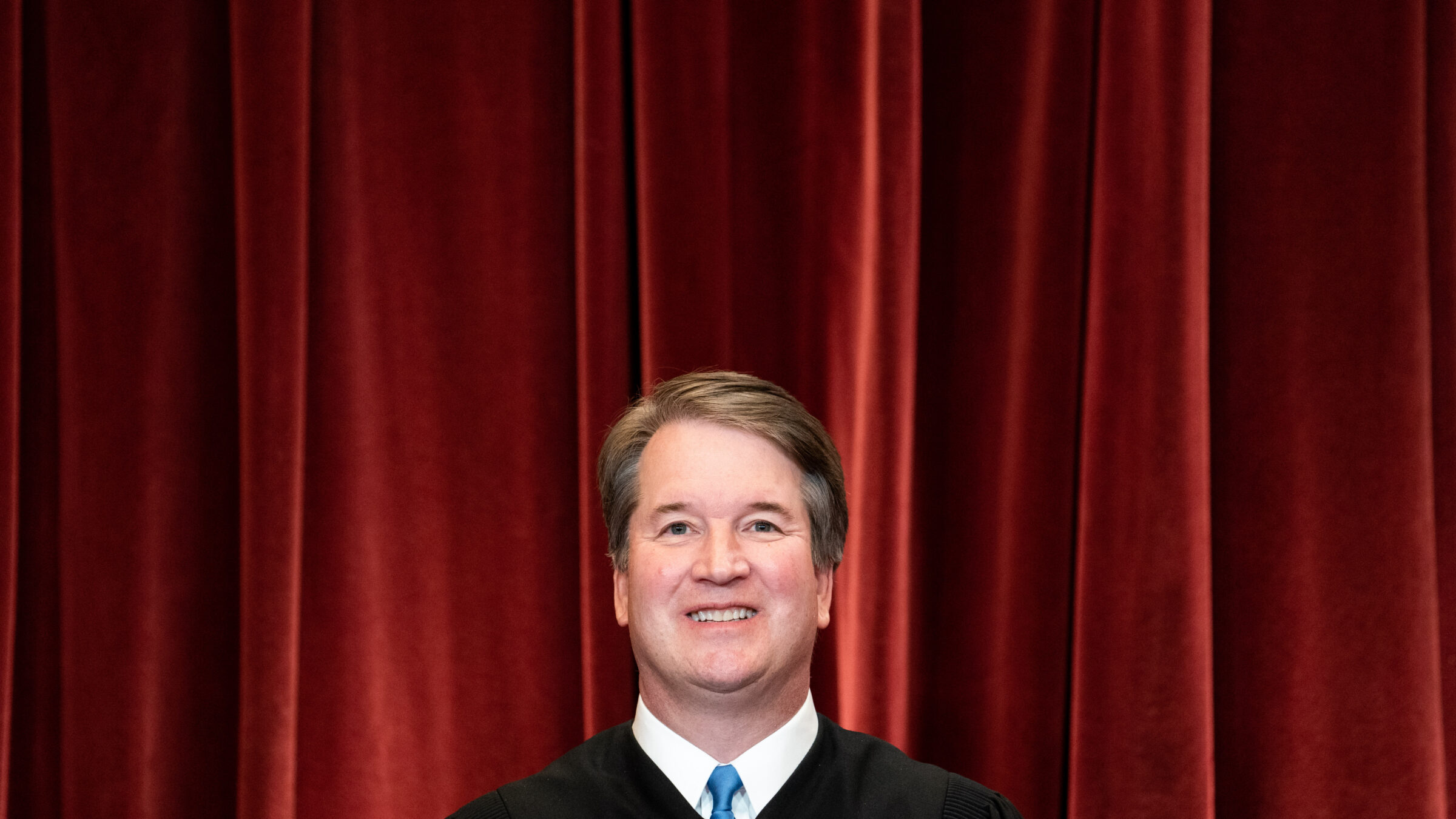
(Photo by Erin Schaff-Pool/Getty Images)
Somehow, Kavanaugh’s Lyons discussion only gets less coherent. Again, the Lyons Court argued that Adolph Lyons was not in danger of being choked to the point of unconsciousness by law enforcement a second time. But as Sotomayor points out, in this case, the plaintiffs are likely to be detained again, because the evidence shows that immigration agents keep returning to the same places around Southern California, looking for vaguely Latino-looking people to fill their daily arrest quotas. A pretty basic lesson of first-year legal writing classes is that if you are making your argument by analogizing to another case, and a quick glance at the facts makes clear that two central premises of the other case make it irrelevant to the one before you, you should set it aside and go back to the Westlaw mines to find something else.
From there, Kavanaugh moves on to balancing the harms and equities—his attempt to parse, at this early stage of litigation, whether it would be better to allow the government to implement its challenged policy of racial profiling, or to temporarily block it while the legal challenge winds its way through the court system. For Kavanaugh, who in a wild coincidence has become more enthusiastic about unfettered executive power since Trump took office in January, this question has an easy answer: The Trump administration should be able to go forward, he says, because the countervailing legal interests of undocumented people who want to “avoid being stopped by law enforcement for questioning” are not “especially weighty.”
Again, let us set aside the alarmingly casual authoritarian sympathies evinced by a Supreme Court justice twisting himself into rhetorical knots to rebrand unabashed racial profiling as a constitutionally acceptable practice, as long as some of its targets overstayed a visa. By framing the legal interests at stake primarily in terms of undocumented people seeking to evade police, Kavanaugh glosses over the interests of millions of Latino U.S. citizens and legal residents who do not want to risk getting gang-tackled on their way to work by neckbearded ICE goons whose forearm tattoos indicate a deep-seated passion for Nordic mythology. In his mind, there is no greater threat to the constitutional order than even temporary limitations on a Republican president’s ability to set aside the rights of people he does not like.
Perhaps the silliest line in the opinion comes when Kavanaugh, perhaps gently prompted by a clerk who has ventured outside Northwest Washington at some point in the past 30 years, considers the implications of his reasoning for people who are “legally in this country.” Fortunately, Kavanaugh says, they have no reason to worry: “The questioning in those circumstances is typically brief, and those individuals may promptly go free after making clear to the immigration officers that they are U.S. citizens or otherwise legally in the United States.”
Kavanaugh’s assurances, which read like a lightly polished excerpt from a court-mandated police training video, would come as news to Jason Gavidia, a U.S. citizen and plaintiff in this case who was attacked by armed immigration agents after he hesitated while trying to remember the name of the hospital in which he was born. The agents let him go only after Gavidia provided his ID card, which they did not give back. It would also come as news to Jorge Viramontes, another U.S. citizen plaintiff, whom agents subjected to four interrogations in nine days, at one point detaining him in a warehouse until they could verify his citizenship.
As Sotomayor writes, other raids in Southern California have involved “even more force and even fewer questions.” But the costs of imposing a universal “show me your papers” standard—on documented immigrants, undocumented immigrants, and U.S. citizens alike—do not seem to have occurred to Brett Kavanaugh, because he has never contemplated what it might be like to be targeted by such a standard in the first place.
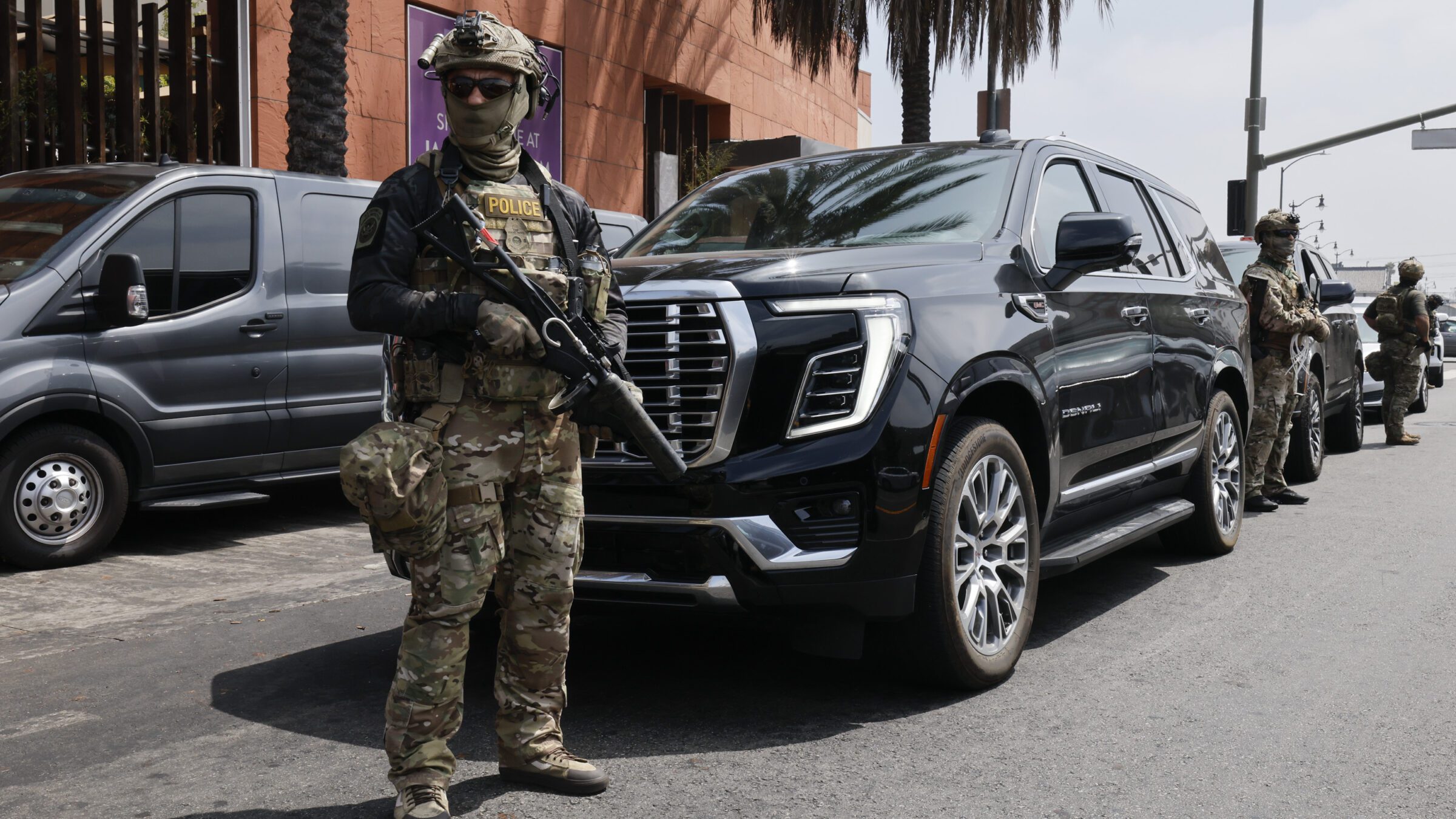
(Carlin Stiehl / Los Angeles Times via Getty Images)
As Kavanaugh so often does in his concurring opinions, he wraps with a “to be sure” section in which he downplays the real-life consequences of his choice, hoping to avoid (even more) dirty looks from his Chevy Chase neighbors who find him (for various reasons) contemptible and gross. He claims to “recognize and fully appreciate” that “many (but not all)” undocumented people come to the United States to “make better lives for themselves and their families,” and he professes his sympathy for those who feel “somewhat misled” by changes in U.S. immigration policy over the decades. But, Kavanaugh continues, because they are here illegally, the government is entitled to enforce the law against them; by comparison, he says, their interest in evading detection is “not particularly substantial.”
Strictly speaking, it is right to say that Trump, as the president, has the prerogative to enforce federal law, including immigration law. But this prerogative is not absolute; like all presidents, Trump has to enforce the law under the basic limitations imposed by the Constitution, which protects documented and undocumented people alike. Kavanaugh seems incapable of understanding that the lower court’s order did not stop the Trump administration from arresting undocumented people pursuant to its anti-immigrant agenda. The order simply stopped the Trump administration from assuming that people are undocumented because of what they look like, and then throwing them in the back of an unmarked van and peeling out.
Among a certain segment of the legal commentariat, there is an annoyingly persistent narrative that Kavanaugh is part of the conservative supermajority’s less reactionary bloc, along with Chief Justice John Roberts (whom Kavanaugh idolizes) and Justice Amy Coney Barrett. Yet in recent months, Kavanaugh has been repeatedly dropping hints that he is lurching to the right, and now sits ideologically closer to Justices Clarence Thomas and Sam Alito than anyone else.
Everything about this opinion—its unearned confidence, its credulous narrative, its bootlicking deference to authority—suggests that this process is happening even faster than I thought. At one point, he contrasts presidents who prioritize the “strict” enforcement of immigration law with presidents who take a more “laissez-faire approach,” which reads as the thought process of a man who has been consuming a lot of Fox News segments about “open borders Democrats.”
In recent years, as the Court has embraced using its shadow docket to rewrite the law as the conservatives see fit, I (and many others) have often criticized the justices for not bothering to show their work. Kavanaugh’s choice to crank out an opinion this time nicely illustrates the benefits of their chosen approach: If you are incapable of explaining yourself coherently, perhaps it is more prudent not to write at all.
